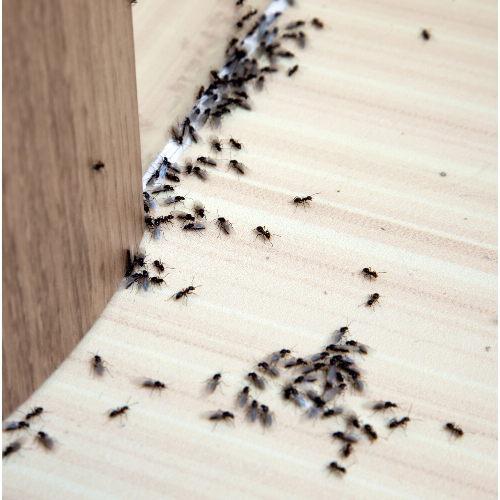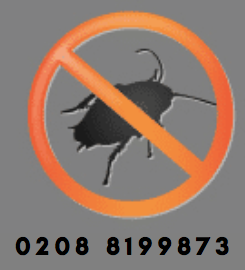Garden Ant Infestation? Let Merton Pest Control Restore Peace to Your Merton Home!
Garden ants can be a nuisance for homeowners, especially when they start invading your outdoor space and potentially finding their way inside your house. These tiny creatures can create unsightly anthills, damage your garden plants, and even contaminate food. However, with the help of Merton Pest Control, you can effectively manage and eliminate garden ant infestations in Merton.

Merton Pest Control is a professional pest management service that specializes in dealing with various pest problems, including garden ants. They employ trained and experienced pest control technicians who understand the behavior and habits of ants, allowing them to implement effective strategies to eliminate these pests from your property.
Here’s how Merton Pest Control can help you tackle garden ants:
- Inspection: Upon contacting Merton Pest Control, their technicians will conduct a thorough inspection of your garden and surrounding areas to determine the extent of the ant infestation. They will identify the ant species present and locate their nests and entry points.
- Customized Treatment Plan: Based on the inspection results, Merton Pest Control will develop a tailored treatment plan to address the specific ant infestation in your garden. This plan will take into account the severity of the problem, the type of ants involved, and any specific requirements or concerns you may have.
- Environmentally Friendly Solutions: Merton Pest Control prioritizes the use of environmentally friendly and safe pest control methods. They employ advanced techniques and low-toxicity treatments that effectively target the ants while minimizing any potential harm to your garden, pets, or family members.
- Ant Colony Elimination: Merton Pest Control’s technicians will employ targeted strategies to eliminate the ant colonies, rather than merely treating the visible ants. They will use appropriate insecticides, baits, or other effective methods to ensure complete eradication of the ant population.
- Prevention Measures: To prevent future ant infestations, Merton Pest Control will offer recommendations and guidance on how to make your garden less attractive to ants. They may suggest modifications to your landscaping, sealing entry points, or implementing preventive measures to reduce the likelihood of future infestations.
- Ongoing Monitoring: Merton Pest Control understands that pest control is an ongoing process. They may schedule follow-up visits to ensure the effectiveness of the treatment and make any necessary adjustments if required.
By engaging Merton Pest Control’s services, you can regain control of your garden and eliminate the annoyance and potential damage caused by garden ants. Their expertise and tailored approach will help create a pest-free environment, allowing you to enjoy your outdoor space without the constant presence of these unwanted intruders.
Remember, it’s always best to consult with professionals when dealing with pest infestations, as they have the knowledge, experience, and tools to address the problem effectively. Merton Pest Control can provide the necessary expertise to handle garden ant issues and restore peace to your Merton home.
Effective Methods and Treatment Plans to Get Rid of Ants
Introduction:
Dealing with an ant infestation can be a frustrating experience for homeowners. However, with the right approach and treatment plans, you can effectively eliminate ants from your home and prevent future invasions. In this article, we will explore some of the best methods and treatment plans offered by professional pest control services to get rid of ants.
Identify the Ant Species:
Different ant species require different treatment approaches. It is important to identify the specific type of ants infesting your home to determine the most effective treatment plan. Some common ant species include pavement ants, carpenter ants, odorous house ants, and pharaoh ants.
Keep a Clean Environment:
Maintaining a clean and hygienic environment is essential for ant control. Ants are attracted to food and water sources, so ensure that all surfaces, floors, and countertops are regularly cleaned and free of crumbs or spills. Store food in airtight containers and promptly fix any leaks or standing water sources.
Seal Entry Points:
Prevent ants from entering your home by sealing all possible entry points. Check for cracks, gaps, or openings in windows, doors, and foundation walls. Seal these areas with caulk or weatherstripping to eliminate potential entry points for ants.
Natural Remedies:
For minor ant infestations, you can try some natural remedies to deter and repel ants. Common options include sprinkling cinnamon, vinegar, or lemon juice along ant trails or near entry points. These natural substances interfere with the ants’ pheromone trails and discourage their presence.
Baiting:
Baiting is an effective method for eliminating ants at their source. Ant baits consist of attractive food mixed with a slow-acting insecticide. The foraging ants carry the bait back to their colony, where it is shared with other ants, eventually eradicating the entire population.
Insecticide Treatment:
In cases of severe infestations or when natural remedies and baits are ineffective, professional pest control services offer targeted insecticide treatments. These treatments are typically applied in specific areas where ants are active or in hidden nesting sites. Professional technicians have the expertise to use insecticides safely and effectively.
Integrated Pest Management (IPM):
Integrated Pest Management is a comprehensive approach to pest control that focuses on long-term prevention and management. It combines various strategies, including regular inspections, identification of conducive conditions, exclusion measures, and targeted treatments. IPM aims to minimize the use of pesticides and promote environmentally friendly solutions.
Conclusion:
Getting rid of ants requires a combination of proactive measures, proper identification, and the implementation of effective treatment plans. While DIY methods can help with minor infestations, severe or persistent ant problems often require the expertise of professional pest control services. By employing the right methods and treatment plans, you can successfully eliminate ants from your home and maintain a pest-free environment.
Frequently asked questions (FAQs) about ant control in Merton
- Q: How can I identify an ant infestation in my home? A: Signs of an ant infestation include the presence of ant trails, small piles of dirt or debris near entry points, sightings of live ants in your home, or the discovery of ant nests in outdoor areas.
- Q: Are all ant species harmful? A: While some ant species are simply a nuisance, others can cause structural damage to your home or contaminate food. It is important to identify the species to determine the level of threat and appropriate treatment.
- Q: Can I control an ant infestation on my own? A: For minor ant problems, DIY methods and natural remedies can be effective. However, severe or recurring infestations often require professional pest control services to ensure complete eradication.
- Q: How do professional pest control services treat ant infestations? A: Pest control services employ various methods, including baiting, insecticide treatments, and integrated pest management (IPM) techniques to eliminate ant colonies and prevent future infestations. Treatment plans are customized based on the specific needs of your situation.
- Q: Are the pesticides used by pest control services safe for my family and pets? A: Reputable pest control services prioritize the safety of occupants and pets. They use low-toxicity or environmentally friendly insecticides and follow strict application guidelines to minimize any risks.
- Q: How long does it take to get rid of an ant infestation? A: The time required to eliminate an ant infestation depends on factors such as the size of the colony, the species involved, and the effectiveness of the treatment. Professional services usually provide an estimate based on the severity of the problem.
- Q: How can I prevent future ant infestations? A: Prevention measures include keeping your home clean and free of food debris, sealing entry points, maintaining proper landscaping, and addressing moisture issues. Professional pest control services can offer additional guidance on prevention strategies.
- Q: Are ant infestations a common problem in Merton? A: Ant infestations are relatively common in residential areas, including Merton. The availability of food sources, favorable climate, and proximity to outdoor environments make homes susceptible to ant invasions.
- Q: Is it necessary to have ongoing pest control services after treating an ant infestation? A: While not always required, regular inspections and preventative treatments can help identify and address any potential re-infestations early on, reducing the risk of future ant problems.
- Q: How can I choose the right pest control service for ant control in Merton? A: Consider hiring a licensed and experienced pest control company with a good reputation. Look for companies that offer customized treatment plans, use safe practices, and provide warranties or guarantees on their services.
Remember, if you have specific concerns or questions about ant control in Merton, it’s best to consult with a professional pest control service that can assess your situation and provide tailored advice and solutions.
Inside the Intricate World of Ant Colonies: Structure, Behavior, and Effective Control Strategies
Ant colonies are highly organized and complex social structures created and maintained by various ant species. These colonies consist of thousands to millions of individual ants working together to ensure the survival and success of the colony as a whole. Understanding the dynamics and characteristics of ant colonies can provide insights into their behavior and aid in effective ant control strategies.
- Structure: Ant colonies typically consist of different castes, each with specific roles and responsibilities. The castes include the queen, males, workers, and sometimes soldiers. The queen’s primary role is reproduction, while the workers perform various tasks such as foraging, nest building, caring for the young, and defending the colony.
- Nesting: Ant colonies establish nests in a variety of locations, depending on the species. Nests can be found underground, in trees, inside wall voids, or even within cracks and crevices in structures. The nests provide protection, shelter, and a central hub for the ants to carry out their activities.
- Communication: Ants communicate with each other through a combination of chemical signals, touch, and sound. They use pheromones, chemical substances emitted by individuals, to convey information about food sources, trail marking, danger, and nestmate recognition. This communication system allows ants to coordinate their efforts effectively.
- Division of Labor: One of the remarkable aspects of ant colonies is the division of labor among the different castes. Workers assume different tasks based on age and needs of the colony. Some workers may be responsible for foraging and gathering food, while others focus on nest maintenance, brood care, or defense. This division of labor ensures the efficient functioning of the colony.
- Reproduction: The queen ant is the primary reproductive individual in the colony. She mates with males during a brief period in her life and stores sperm to fertilize eggs throughout her lifespan. The queen’s primary role is to lay eggs, which will develop into new members of the colony. In some ant species, colonies can have multiple queens, while in others, a single queen dominates.
- Expansion and Colony Growth: Ant colonies have the ability to expand and grow rapidly. The queen continually produces eggs, and the workers support the colony’s growth by finding new resources and suitable nesting sites. As the colony size increases, satellite nests or multiple interconnected nests may be established to accommodate the growing population.
- Defense Mechanisms: Ant colonies exhibit various defense mechanisms to protect themselves from threats. Soldiers, with their larger heads and powerful mandibles, defend the colony against predators and intruders. Workers may also engage in group defense behaviors, such as forming a protective circle around the nest or releasing alarm pheromones to signal danger.
Understanding the structure and behavior of ant colonies is crucial for effective ant control. Pest control professionals employ targeted strategies to disrupt and eliminate colonies, focusing on the queen and key reproductive individuals. By disrupting the colony’s reproductive cycle and eliminating the nest, pest control measures can successfully eliminate ant infestations and prevent their recurrence.
Overall, ant colonies are fascinating examples of complex social organizations in the insect world. Their intricate structures and cooperative behaviors allow ants to thrive and adapt to various environments, making them a resilient and challenging pest to manage.

